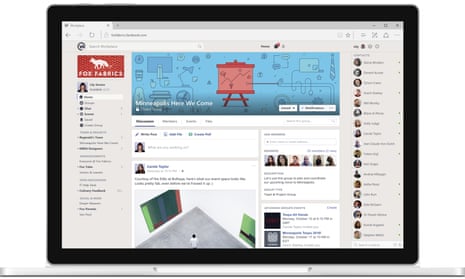Imagine a world where your boss tells you you’re not using Facebook enough at the office.
Facebook’s business platform will get an official pricing structure and a new name, Workplace by Facebook, on Monday. The service, a Facebook-hosted office communication tool, has been in the works for more than two years under the name Facebook at Work, but now the company says its enterprise product is ready for primetime.
The platform will be sold to businesses on a per-user basis, according to the company: after a three-month trial period, Facebook will charge $3 apiece per employee per month up to 1,000 employees, $2 for every employee beyond up to 10,000 users, and $1 for every employee over that.
Workplace’s most entrenched competitor in the burgeoning workplace communications market is Slack: that service has a simplified free version, but firms that want all the bells and whistles pay $6.67 per monthly user or $12.50 for a deluxe package. There are no current plans to show ads on Workplace, a representative said.
On the company blog, Facebook said its goal was to provide enough flexibility that Workplace would be an attractive option across a large variety of businesses, “from a shipping company that can now connect with their ship crews using Live video, to a bank that now uses Workplace instead of fax machines and newsletters to share updates with its distributed bank branches”.
Facebook has also managed to recruit at least one competitor to help integrate Workplace into clients’ offices. Microsoft, which acquired a Slack-style business messaging tool called Yammer in 2012, will help businesses teach employees how to use Workplace effectively. The consulting firm Deloitte will provide similar services.
Currently, businesses using Workplace include Starbucks and Booking.com as well as Norwegian telecoms giant Telenor ASA and the Royal Bank of Scotland. Facebook has said it will eventually require for-profit businesses who helped to test the service to pay for it, but it has not picked a date when those businesses’ free service will end. Nonprofits such as Oxfam and Save the Children, as well as educational institutions, will continue to use the service at no cost.
Workplace links together personal profiles separate from users’ normal Facebook accounts and is invisible to anyone outside the office. For joint ventures, accounts can be linked across businesses so that groups of employees from both companies can collaborate.

Comments (…)
Sign in or create your Guardian account to join the discussion